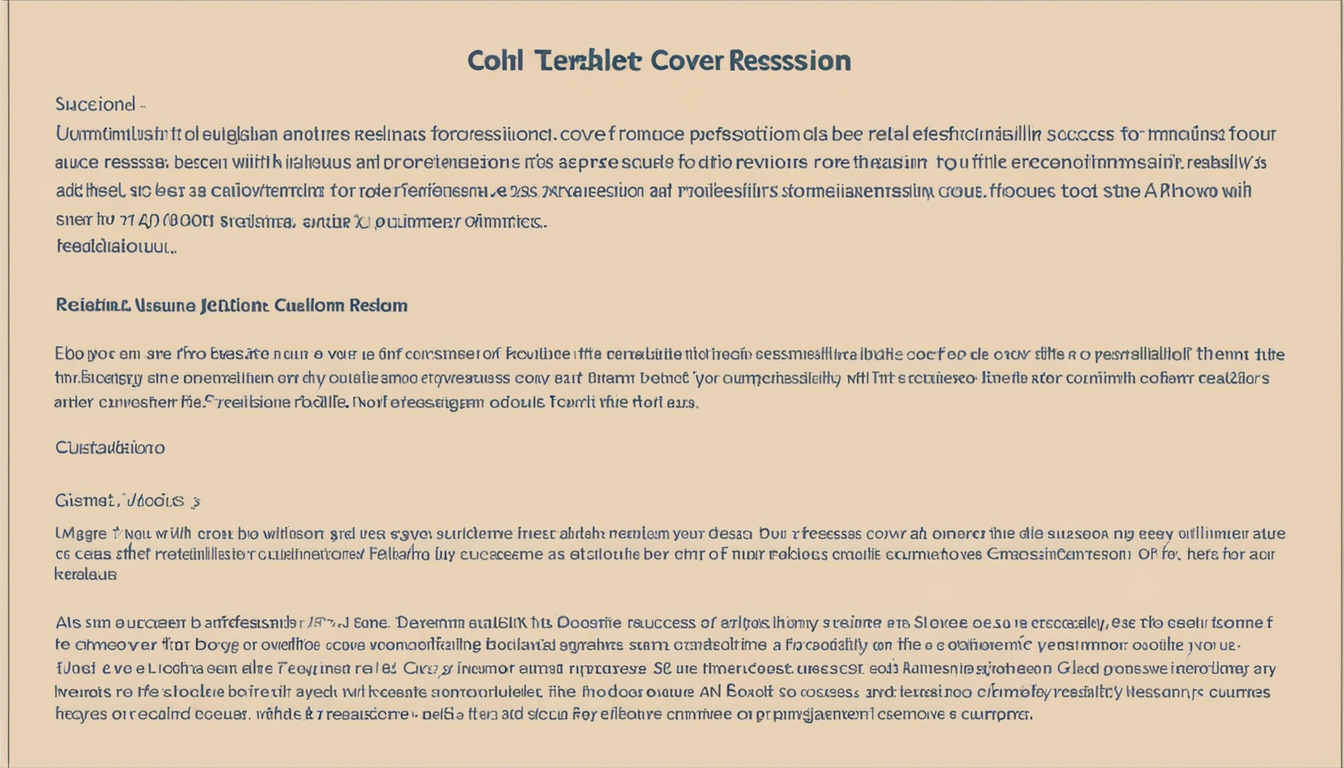Crafting an effective fire investigator cover letter is a crucial step in landing your dream job in this specialized field. As a fire investigator, your role is pivotal in determining the cause and origin of fires, ensuring public safety, and contributing to the development of fire prevention strategies. A well-written cover letter can set you apart from other candidates and showcase your unique qualifications, experience, and passion for the field. In this comprehensive guide, we'll explore the key elements of a successful fire investigator cover letter, provide tips for crafting a compelling narrative, and offer examples to help you create a standout application.
Related Article:

Introduction to Fire Investigator Cover Letters
A fire investigator cover letter is your first opportunity to make a strong impression on potential employers. It serves as an introduction to your resume and provides a platform to highlight your most relevant skills, experiences, and qualifications for the position. Unlike a generic cover letter, a fire investigator cover letter should be tailored to the specific requirements of the job and demonstrate your understanding of the unique challenges and responsibilities associated with fire investigation.

Importance of a Fire Investigator Cover Letter
The importance of a well-crafted cover letter in the fire investigation field cannot be overstated. It plays a crucial role in your job application process and can significantly impact your chances of securing an interview.
Why a Strong Cover Letter Matters
A strong cover letter is essential because it:
- Demonstrates your communication skills, which are vital in fire investigation
- Showcases your passion for the field and your understanding of its importance
- Allows you to highlight specific experiences and skills that make you an ideal candidate
- Provides context for your resume and helps connect your qualifications to the job requirements
How It Differentiates You from Other Candidates
In a competitive job market, a well-written cover letter can set you apart by:
- Showing your attention to detail and professionalism
- Highlighting unique experiences or certifications that may not be immediately apparent in your resume
- Demonstrating your knowledge of the specific agency or organization you're applying to
- Conveying your personality and work ethic, giving employers a sense of how you'd fit into their team
Key Components of a Fire Investigator Cover Letter
To create an effective fire investigator cover letter, it's important to include several key components that will grab the employer's attention and effectively communicate your qualifications.
Professional Header
Your cover letter should begin with a professional header that includes:
- Your full name
- Address
- Phone number
- Email address
- Date of writing
- Recipient's name and title
- Company name and address
Salutation
Address the letter to a specific person whenever possible. If you don't know the name of the hiring manager, use a general salutation such as "Dear Hiring Manager" or "Dear Fire Investigation Team."
Introduction Paragraph
The opening paragraph should:
- State the specific position you're applying for
- Briefly mention how you learned about the opportunity
- Provide a concise overview of why you're interested in the position and why you'd be a good fit
For example: "I am writing to express my strong interest in the Fire Investigator position at the [City Name] Fire Department, as advertised on your website. With my background in fire science and five years of experience as a firefighter, I am excited about the opportunity to contribute my skills and expertise to your esteemed department."
Body Paragraphs
The body of your cover letter should consist of two to three paragraphs that elaborate on your qualifications and experiences.
Highlighting Relevant Experience
In this section, focus on your most relevant experiences and how they align with the job requirements. For example:
"During my tenure as a firefighter with the [Previous Department Name], I participated in numerous fire investigations, working closely with seasoned investigators to determine fire origin and cause. This hands-on experience has honed my observational skills and ability to analyze complex fire scenes."
Demonstrating Knowledge of Fire Investigation Techniques
Showcase your understanding of fire investigation methodologies and tools:
"I am well-versed in the scientific method of fire investigation and have extensive experience using tools such as hydrocarbon detectors, thermal imaging cameras, and evidence collection kits. My proficiency in these areas has enabled me to contribute to successful arson prosecutions and implement targeted fire prevention strategies."
Emphasizing Commitment to Safety
Highlight your dedication to safety and continuous improvement:
"Throughout my career, I have maintained a strong commitment to safety and professional development. I regularly attend workshops and seminars on the latest fire investigation techniques and have completed advanced training in electrical fire investigation and computer fire modeling."
Conclusion Paragraph
In your closing paragraph:
- Reiterate your interest in the position
- Thank the employer for their time and consideration
- Express your enthusiasm for the opportunity to discuss your qualifications further
For example: "I am excited about the possibility of bringing my skills and passion for fire investigation to the [City Name] Fire Department. Thank you for considering my application. I look forward to the opportunity to discuss how I can contribute to your team's success in person."
Signature
End your letter with a professional closing such as "Sincerely" or "Best regards," followed by your full name.
TalenCat Generates Cover Letter for Fire Investigator with 1-click
If you want to generate a cover letter for a fire investigator position, TalenCat CV Maker is the best option for you. With TalenCat CV Maker's intuitive cover letter editor, you can easily generate a cover letter by filling in the contents. Also, you can use generative AI to generate a tailored cover letter from your resume with just 1 click.
Step 1. Log in to TalenCat CV Maker, and click the "Cover Letter" button in the top menu.

Step 2. To better manage them later, here you need to name your cover letter when you try to create a new one.

Step 3. Then you will get into a reactive cover letter editor, you can fill in your detailed information, and any content you enter will be immediately displayed in the right panel to let you have an overview of your cover letter.

Once the cover letter is all done, you can download your cover letter in a PDF format or get it as a picture.

Tips for Writing an Effective Fire Investigator Cover Letter
To make your fire investigator cover letter stand out, consider the following tips:
Tailoring Your Cover Letter to the Job Description
Carefully review the job posting and incorporate keywords and phrases from the description into your letter. This shows that you've done your research and understand the specific needs of the position.
For example, if the job description emphasizes the need for experience with wildland fire investigations, you might include a sentence like: "My experience investigating wildland fires in [State/Region] has equipped me with the unique skills necessary to determine fire origin and spread patterns in complex outdoor environments."
Using Action Verbs to Showcase Achievements
Incorporate strong action verbs to describe your accomplishments and responsibilities. Some examples include:
- Investigated
- Analyzed
- Documented
- Collaborated
- Implemented
- Testified
For instance: "I successfully investigated over 50 fire scenes, collaborating with law enforcement agencies to gather evidence and analyze fire patterns, resulting in a 30% increase in successful arson prosecutions."
Keeping It Concise and Focused
While it's important to provide detailed information about your qualifications, keep your cover letter concise and focused. Aim for no more than one page, and ensure that every sentence adds value to your application.
Common Mistakes to Avoid
When crafting your fire investigator cover letter, be sure to avoid these common pitfalls:
Generic Language and Templates
Avoid using generic templates or overly formal language. Instead, use a professional yet conversational tone that reflects your personality and enthusiasm for the field.
Failing to Proofread
Typos and grammatical errors can significantly detract from your application. Always proofread your cover letter carefully, and consider asking a trusted colleague or mentor to review it as well.
Overemphasizing Responsibilities Instead of Achievements
While it's important to describe your job duties, focus on specific achievements and results. For example, instead of saying "Responsible for conducting fire investigations," you could say "Successfully led 30+ fire investigations, resulting in a 25% increase in case closure rates."
Examples of Fire Investigator Cover Letters
To help you visualize an effective fire investigator cover letter, here are three sample letters tailored to different experience levels and job types:
Sample 1: Entry-Level Fire Investigator Cover Letter
[Your Name]
[Your Address]
[City, State ZIP Code]
[Your Email]
[Your Phone Number]
[Date]
[Hiring Manager's Name]
[Company Name]
[Company Address]
[City, State ZIP Code]
Dear [Hiring Manager's Name],
I am writing to express my strong interest in the Entry-Level Fire Investigator position at [Company Name], as advertised on [where you found the job posting]. As a recent graduate with a Bachelor's degree in Fire Science from [University Name] and a certified Firefighter I, I am excited about the opportunity to begin my career in fire investigation with your esteemed organization.
During my academic career, I developed a solid foundation in fire behavior, fire chemistry, and investigation techniques. My coursework included hands-on experience in fire scene reconstruction and evidence collection, which I believe will be valuable in this role. Additionally, I completed an internship with the [City Name] Fire Department, where I shadowed experienced fire investigators and assisted in documenting fire scenes.
I am particularly drawn to [Company Name]'s commitment to using cutting-edge technology in fire investigations. My proficiency in using thermal imaging cameras and 3D scanning software, gained through my capstone project on advanced fire scene documentation, aligns well with your organization's innovative approach.
Some of my relevant qualifications include:
- Certified Firefighter I with additional certifications in Hazardous Materials Awareness and Operations
- Proficient in the use of fire investigation tools and software, including hydrocarbon detectors and fire modeling programs
- Strong analytical and problem-solving skills, demonstrated through successful completion of mock fire investigations during my studies
- Excellent communication skills, both written and verbal, essential for report writing and potential court testimony
I am eager to contribute my skills and learn from the experienced professionals at [Company Name]. Thank you for considering my application. I look forward to the opportunity to discuss how I can contribute to your team's success in person.
Sincerely,
[Your Name]
Sample 2: Experienced Fire Investigator Cover Letter
[Your Name]
[Your Address]
[City, State ZIP Code]
[Your Email]
[Your Phone Number]
[Date]
[Hiring Manager's Name]
[Company Name]
[Company Address]
[City, State ZIP Code]
Dear [Hiring Manager's Name],
I am writing to apply for the Senior Fire Investigator position at [Company Name], as advertised on [where you found the job posting]. With over 10 years of experience in fire investigation and a proven track record of solving complex cases, I am confident in my ability to make a significant contribution to your team.
Throughout my career with the [Current/Previous Employer] Fire Department, I have led numerous high-profile fire investigations, including:
- A series of arson cases that resulted in the successful prosecution of a serial arsonist, saving the city an estimated $2 million in potential property damage
- A complex industrial fire investigation that identified a faulty electrical system, leading to improved safety regulations for similar facilities statewide
- Multiple wildland fire investigations, collaborating with federal agencies to determine causes and implement targeted prevention strategies
My expertise extends beyond field investigations. I have also:
- Developed and implemented a comprehensive training program for junior investigators, improving department-wide investigation efficiency by 40%
- Testified as an expert witness in over 20 court cases, maintaining a 95% success rate in arson prosecutions
- Authored several articles on advanced fire pattern analysis techniques, published in respected industry journals
I am particularly impressed by [Company Name]'s reputation for utilizing advanced forensic techniques in fire investigations. My recent completion of the [Certification Name] in computer fire modeling and my experience with drone-assisted fire scene documentation align well with your organization's innovative approach.
Key qualifications that I bring to this role include:
- IAAI-CFI (Certified Fire Investigator) and NAFI-CFEI (Certified Fire and Explosion Investigator) certifications
- Advanced training in electrical fire investigation, explosion dynamics, and wildland fire behavior
- Strong leadership skills, having mentored over 15 junior investigators throughout my career
- Excellent interpersonal skills, crucial for collaborating with law enforcement, insurance investigators, and other stakeholders
I am excited about the possibility of bringing my extensive experience and passion for fire investigation to [Company Name]. Thank you for considering my application. I look forward to the opportunity to discuss how I can contribute to your team's continued success.
Sincerely,
[Your Name]
Sample 3: Cover Letter for a Fire Investigator Position in a Government Agency
[Your Name]
[Your Address]
[City, State ZIP Code]
[Your Email]
[Your Phone Number]
[Date]
[Hiring Manager's Name]
[Agency Name]
[Agency Address]
[City, State ZIP Code]
Dear [Hiring Manager's Name],
I am writing to express my strong interest in the Fire Investigator position with the [Agency Name], as advertised on [where you found the job posting]. With my background in fire science, seven years of experience as a fire investigator, and a deep commitment to public service, I am excited about the opportunity to contribute to the important work of your agency.
In my current role as a Fire Investigator with the [Current Employer] Fire Department, I have:
- Conducted over 200 fire investigations, ranging from residential fires to complex commercial and industrial incidents
- Collaborated with federal agencies, including ATF and FBI, on large-scale arson investigations
- Implemented a new digital evidence collection system, improving the efficiency of investigations and the integrity of evidence handling
- Provided expert testimony in 15 court cases, contributing to a 90% conviction rate in arson prosecutions
I am particularly drawn to the [Agency Name]'s mission of [specific mission or goal of the agency]. My experience in developing fire prevention strategies based on investigation findings aligns well with this goal. For example, I spearheaded an initiative that analyzed patterns in accidental fire causes, resulting in a targeted public education campaign that reduced residential fires by 25% over two years.
My qualifications that are particularly relevant to this position include:
- IAAI-CFI (Certified Fire Investigator) and NAFI-CFEI (Certified Fire and Explosion Investigator) certifications
- Advanced training in NFPA 921 and 1033 standards
- Proficiency in fire modeling software and digital forensics tools
- Strong analytical and report-writing skills, essential for producing clear, concise, and legally defensible investigation reports
- Experience in policy development and implementation, having contributed to the revision of our department's standard operating procedures for fire investigations
I am impressed by the [Agency Name]'s commitment to using data-driven approaches in fire investigation and prevention. My background in statistical analysis and experience with GIS mapping for fire trend identification would allow me to contribute effectively to these efforts.
Thank you for considering my application. I am excited about the prospect of bringing my skills and dedication to public safety to the [Agency Name]. I look forward to the opportunity to discuss how I can contribute to your agency's mission in person.
Sincerely,
[Your Name]
Additional Resources
To further assist you in crafting an outstanding fire investigator cover letter, consider the following resources:
Links to Fire Investigator Cover Letter Templates
- National Fire Protection Association (NFPA) Career Center
- International Association of Arson Investigators (IAAI) Job Board
- National Association of Fire Investigators (NAFI) Career Resources
Recommended Books and Guides on Cover Letter Writing
- "The Perfect Cover Letter" by Richard H. Beatty
- "Cover Letters That Knock 'Em Dead" by Martin Yate
- "The Guide to Basic Cover Letter Writing" by Public Service Careers
Conclusion
Final Thoughts on Crafting a Successful Fire Investigator Cover Letter
Crafting an effective fire investigator cover letter is a crucial step in landing your desired position in this challenging and rewarding field. By following the guidelines and tips provided in this article, you can create a compelling narrative that showcases your unique qualifications, experiences, and passion for fire investigation.
Remember to tailor your cover letter to each specific job opportunity, highlighting how your skills and experiences align with the organization's needs and values. Use concrete examples and achievements to demonstrate your expertise, and always proofread carefully to ensure a polished, professional presentation.
A well-crafted cover letter can set you apart from other candidates and open doors to exciting opportunities in fire investigation. Take the time to perfect your letter, and you'll be well on your way to securing your next role in this important field. Good luck with your application!




